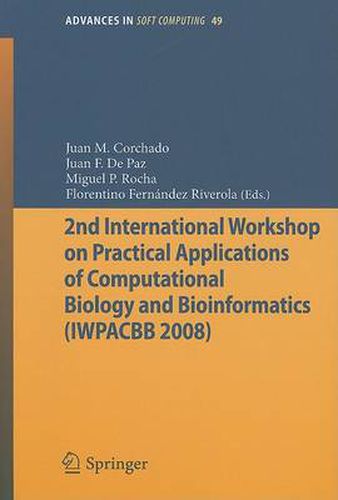Readings Newsletter
Become a Readings Member to make your shopping experience even easier.
Sign in or sign up for free!
You’re not far away from qualifying for FREE standard shipping within Australia
You’ve qualified for FREE standard shipping within Australia
The cart is loading…






This title is printed to order. This book may have been self-published. If so, we cannot guarantee the quality of the content. In the main most books will have gone through the editing process however some may not. We therefore suggest that you be aware of this before ordering this book. If in doubt check either the author or publisher’s details as we are unable to accept any returns unless they are faulty. Please contact us if you have any questions.
The success of Bioinformatics in recent years has been prompted by research in mole- lar biology and medicine in initiatives like the human genome project. The volume and diversification of data has increased so much that it is very hard if not impossible to analyze it by human experts. The analysis of this growing body of data, intensified by the development of a number of high-throughput experimental techniques that are generating the so called ‘omics’ data, has prompted for new computational methods. New global approaches, such as Systems Biology, have been emerging replacing the reductionist view that dominated biology research in the last decades, requiring the coordinated efforts of biological researchers with those related to data analysis, mathematical modelling and computer science. Computational methods have been helping in tasks related to knowledge discovery, modelling and optimization tasks. This workshop brings the opportunity to discuss applications of Bioinformatics and Computational Biology exploring the interactions between computer scientists, bio- gists and other scientific researchers. The IWPACBB technical program includes 29 papers (23 long papers and 6 short papers) selected from a submission pool of 51 papers, from 9 different countries. We thank the excellent work of the local organization members and also from the members of the Program Committee for their excellent reviewing work. October 2008 Juan M. Corchado Juan F. De Paz Miguel P. Rocha Florentino Fernandez Riverola Organization
$9.00 standard shipping within Australia
FREE standard shipping within Australia for orders over $100.00
Express & International shipping calculated at checkout
This title is printed to order. This book may have been self-published. If so, we cannot guarantee the quality of the content. In the main most books will have gone through the editing process however some may not. We therefore suggest that you be aware of this before ordering this book. If in doubt check either the author or publisher’s details as we are unable to accept any returns unless they are faulty. Please contact us if you have any questions.
The success of Bioinformatics in recent years has been prompted by research in mole- lar biology and medicine in initiatives like the human genome project. The volume and diversification of data has increased so much that it is very hard if not impossible to analyze it by human experts. The analysis of this growing body of data, intensified by the development of a number of high-throughput experimental techniques that are generating the so called ‘omics’ data, has prompted for new computational methods. New global approaches, such as Systems Biology, have been emerging replacing the reductionist view that dominated biology research in the last decades, requiring the coordinated efforts of biological researchers with those related to data analysis, mathematical modelling and computer science. Computational methods have been helping in tasks related to knowledge discovery, modelling and optimization tasks. This workshop brings the opportunity to discuss applications of Bioinformatics and Computational Biology exploring the interactions between computer scientists, bio- gists and other scientific researchers. The IWPACBB technical program includes 29 papers (23 long papers and 6 short papers) selected from a submission pool of 51 papers, from 9 different countries. We thank the excellent work of the local organization members and also from the members of the Program Committee for their excellent reviewing work. October 2008 Juan M. Corchado Juan F. De Paz Miguel P. Rocha Florentino Fernandez Riverola Organization